MND research
This section includes information about participating in research as well as information about alternative and unproven therapies and the development and approval of drugs to treat MND.

Participating in research
Are you thinking about participating in an MND related research project? There are some things you might like to think about before you start. The in...

Brain Donor Program & Biobank
Sydney Brain Bank Based at Neuroscience Research Australia (NeuRA), there is a research clinic focusing on frontotemporal dementia and associated synd...

Australian MND Registry
MiNDAUS is a partnership of Australian MND researchers, clinicians and organisations, which aims to develop a nationally co-ordinated and patient...

MND Research Australia
Members of the Research Committee of MND Research Australia review grant applications and determine the distribution of funds according to the MND Res...
“We can't do this alone. But together, we're unstoppable.”